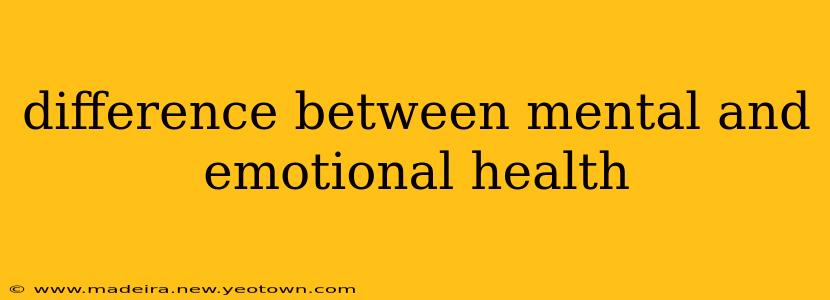The Intricate Dance of Mind and Heart: Understanding the Difference Between Mental and Emotional Health
Imagine your mind as a vast, intricate landscape, a sprawling countryside filled with rolling hills of thoughts, valleys of memories, and towering peaks of ambitions. Now picture your emotions as the weather patterns sweeping across this landscape – sometimes a gentle breeze of contentment, other times a raging storm of anger or sadness. This analogy helps illustrate the subtle, yet significant, difference between mental and emotional health. While deeply interconnected, they are distinct aspects of our overall well-being.
This isn't just an academic distinction; understanding the nuances between mental and emotional health is crucial for recognizing and addressing personal struggles. It allows for more targeted self-care and effective support-seeking.
What is Mental Health?
Mental health encompasses the cognitive functions of our minds: our thoughts, learning, reasoning, memory, and judgment. Think of it as the hardware of your internal world. Good mental health means your mind functions effectively, allowing you to navigate daily life, solve problems, make decisions, and adapt to change. It's about having the mental clarity and resilience to cope with stress and challenges. When mental health falters, it might manifest as difficulty concentrating, persistent negative thoughts, or struggles with decision-making. Conditions like anxiety disorders, depression, and schizophrenia are examples of impaired mental health.
What is Emotional Health?
Emotional health, on the other hand, refers to the feeling side of our inner world – our feelings, moods, and responses to various situations. Consider it the software running on your mental hardware. It's about how we experience and express our emotions – joy, sadness, anger, fear, and love. Good emotional health allows us to manage our feelings effectively, build healthy relationships, and bounce back from setbacks. Emotional dysregulation, where you struggle to manage your emotions, might lead to outbursts, intense anxiety, or persistent sadness.
What are the Signs of Poor Mental Health?
- Persistent negative thoughts: A constant stream of negative self-talk, pessimism, or hopelessness.
- Difficulty concentrating: Struggling to focus on tasks or follow conversations.
- Changes in sleep patterns: Insomnia, excessive sleeping, or disturbed sleep.
- Loss of interest in activities: Apathy and disengagement from hobbies and things you once enjoyed.
- Significant changes in appetite or weight: Unexplained weight loss or gain.
What are the Signs of Poor Emotional Health?
- Emotional outbursts: Uncontrolled anger, sadness, or other intense emotions.
- Difficulty regulating emotions: Struggling to manage emotional responses to everyday situations.
- Persistent feelings of sadness, anxiety, or irritability: Moods that linger for extended periods.
- Difficulty forming or maintaining relationships: Isolation or strained relationships due to emotional challenges.
- Feeling overwhelmed by stress: A constant feeling of being on edge or unable to cope.
How are Mental and Emotional Health Interconnected?
Mental and emotional health are intricately linked. Our thoughts (mental health) significantly influence our feelings (emotional health), and vice versa. For example, negative thought patterns can fuel feelings of anxiety or depression, while managing emotions effectively can improve cognitive function. A person struggling with depression might experience both impaired mental function (difficulty concentrating, decision-making) and emotional distress (persistent sadness, loss of interest).
Can you explain the difference with examples?
Let's imagine two scenarios:
Scenario 1 (Primarily Mental Health Issue): A student struggles to remember information for an exam, despite studying diligently. They might have a learning disability impacting their cognitive abilities (mental health), leading to frustration and anxiety (emotional health). The core problem is a cognitive impairment.
Scenario 2 (Primarily Emotional Health Issue): Someone experiences a sudden burst of anger during a work meeting, causing conflict. This might stem from underlying emotional issues (poor emotional regulation), not necessarily a cognitive deficit. Their mental capacity remains intact; it's the emotional response that's disproportionate.
Ultimately, mental and emotional health are interwoven aspects of our well-being. Addressing challenges in either area often requires a holistic approach, incorporating strategies to support both cognitive function and emotional regulation. Recognizing the distinction allows for more precise identification of needs and more effective pathways to support and recovery.

